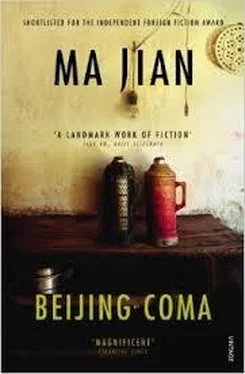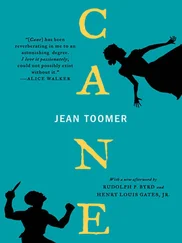Wen Niao still works at the Beijing Pharmaceutical Research Institute. When I met her in the Square after Tian Yi fainted, I couldn’t have guessed that all these years later she’d turn up at my flat to attend to my comatose body. She comes here twice a week to give me injections. Sometimes she brings new drugs the institute has developed and administers them to me free of charge.
How annoying that my mother isn’t here to let her in. She knocks on the door, pauses, then knocks again. She continues to knock for several minutes, then turns round and leaves.
Damn! I wish she’d come back. I always seem to breathe more easily when she’s in the flat. After living in the dark for so long, I yearn for people to visit and bring me news from the world outside.
A few minutes later, I hear Wen Niao return with my mother.
‘I’ll give you my spare set of keys,’ my mother says, opening the front door. ‘I wouldn’t want this to happen again. You must be freezing.’
‘No, I’m fine. I’m used to the cold. Back in Changsha, the winters are much colder than this.’
She and my mother take off their coats and sit on the sofa.
‘Look at this jumper I bought the other day,’ my mother says. ‘The stallholder told me it was 100 per cent lambswool. But when I brought it home, I saw the label says: lambswool, angora and nylon. I hate angora. The whole flat’s covered in rabbit hairs now. I just went to ask him for a refund, but he refused to give me one.’ My mother pushes the box of sunflower seeds across the table and says, ‘Help yourself. These jumpers they sell now, they may look nice, but the quality is terrible.’
I hope Wen Niao doesn’t eat any of those five-spiced sunflower seeds. They smell disgusting.
‘Does your mother still work?’ asks my mother, forgetting she already asked her this last week.
‘She died a long time ago. She was publicly denounced during the Cultural Revolution. They shaved her hair on one side, in the yin-yang style. She felt so humiliated, she swallowed a bottle of pesticide the next day.’ Wen Niao speaks very casually about her mother’s death. It’s strange to think that Tian Yi’s mother committed suicide for the same reason.
‘We survivors of the Cultural Revolution were lucky to escape with our lives.’
‘I see you’ve made a little altar there. Are you a Buddhist?’
‘Well, I’ve taken up Falun Gong. It’s a form of qigong which combines some of the philosophies of Buddhism and Taoism. I had this book, Falun Practice , lying around for ages, but I only started reading it properly last month. It’s very interesting. I bought an instruction tape and have been practising the meditation exercises with some other women in the compound. It’s had a miraculous effect. I hadn’t realised how many little ailments I’ve developed over the years: headaches, chest pain, backache, arthritis. They all seem to have disappeared since I’ve been doing the exercises.’
‘It looks as if Falun Gong might put us pharmacists out of a job!’
‘Why not give it a go? It’s very simple. There are only five sets of exercises, four standing, one sitting. You can start with the first exercise. It will help open up your channels.’
‘I’m in good health — I don’t need to do qigong. But I often visit Buddhist temples and read the Buddhist scriptures.’
‘Look, I’ll show you the pose. Make a circle with your index and thumb, and let your arms relax…’
My mother is probably feeling the qi flow through her channels by now. A few days ago, she practised the exercises for half an hour then slept for a whole day and night. When she woke up, she got straight on the phone to Master Yao.
‘I was very downcast a few months ago, Nurse Wen. I’d decided that if my son died, I’d jump into the grave with him. I’d reached the end. But when I started reading the Falun Gong texts, I suddenly understood why my life has been so difficult. All hardships you encounter result from bad deeds committed in past lives… We’ve now entered the era of chaos that precedes the end of the world. The Buddha won’t be able to save everyone. When the earth is destroyed, only the souls of Falun Gong practitioners will be admitted into Heaven…’ My mother is repeating what Master Yao told her, but has strayed a little from his version.
Wen Niao taps my knee. I can sense that her body temperature is higher than mine. She slips a thermometer into my mouth. When her fingers brush against my nose I see a momentary vision of her face.
‘You should try it. You won’t have to bother taking medicine again.’
‘But I’m a Buddhist, Auntie…’
‘Huh. The Buddha only looks after the next world, but Falun Gong takes care of the present world as well. Anyway, the more gods you believe in the better. Who knows which one might turn up to help you next time you find yourself in trouble?’
‘You must look out for signs of him wanting to swallow,’ Wen Niao says, eager to change the subject. ‘It would indicate nerve cell repair or regeneration.’
‘You really seem to care about my son. I must admit, I’m afraid of him waking up, because if he did, the police would storm in and start asking questions. Sometimes I just wish he’d hurry up and die.’
‘Don’t say that, Auntie. A company in Guangzhou is developing a drug from cows’ brains that will help stimulate brain-cell regeneration. Once it’s in production, I’ll try to get hold of some for you.’
‘Huh! Those drug companies send salesmen to every hospital to bully doctors into prescribing their drugs. They work on commission. If you go to hospital these days, the doctors won’t let you leave until you’ve bought several hundred yuan’s worth of medicine.’
‘I’ve told many pharmaceutical research institutes about Dai Wei’s condition, but unfortunately, as soon as they find out he was involved in the Tiananmen Square protests, they refuse to help.’
Wen Niao opens her case and prepares a syringe of the drug she’s brought today.
‘You’re so kind, Nurse Wen,’ my mother says, walking in from the kitchen. ‘The nurses who came before weren’t nearly as diligent as you. Here, have a cup of tea. It’s freshly brewed. Whatever happens, I insist you have some lunch before you leave. I’ve bought some garlic shoots and pork ribs especially.’
‘Thank you,’ she says, sliding the needle into my vein. ‘It still seems so strange that I met your son in the Square, and here I am seven years later, looking after him. It must have been fate. I even saw him in the early hours of 4 June. He helped me lift dead bodies into the ambulance. Why did he have to end up with a bullet in the head? It’s so unfair…’
‘So you were in the Square that night?’ my mother asks, taken aback.
‘I was in the emergency tent, near the Goddess of Democracy. I saw students being killed right in front of me. There were corpses under Mao’s portrait, near the flagpole on the north side of the Square, and in front of the Museum of Chinese History. I managed to get a lift on an ambulance that was taking casualties to the Children’s Hospital. I was relieved to leave the Square. But when I walked into the hospital’s emergency room, I saw pools of blood everywhere. I had blood up to my ankles… The colleagues of mine who remained in the Square were herded into an enclosure in front of the Museum of Chinese History, and were only released at seven in the morning. They were all sent to work in other cities after that, to ensure they didn’t speak to any foreign journalists.’
‘Did the police interrogate you afterwards?’ They’re sitting on the sofa now.
‘They wanted me to give them the emergency tent’s registration book. They came to my flat many times. One of the officers even became my boyfriend for a while.’
Читать дальше












